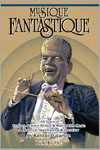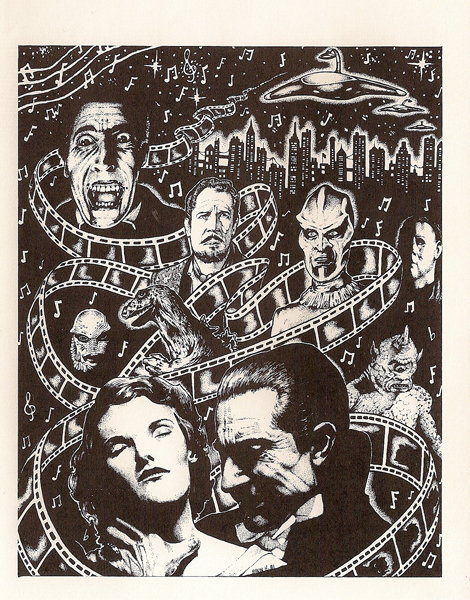September 5, 2021
The Stairs in the Deep, Dark Woods:
Interview: BC Smith: Scoring THE STAIRS
by Randall D. Larson

From his first film score, Chris Eyre’s SMOKE SIGNALS (Sundance Film Festival’s Audience Award and Filmmakers Trophy winner) to horror master Tobe Hooper’s final film DJINN and recently Steven Cantor’s Hulu documentary BALLET NOW, prolific composer BC Smith’s work can be heard in an incredibly broad range of acclaimed and award winning film and television projects. Whether working with modular synthesizers, multifarious ensembles, large orchestras, peyote singers, aleatorics, or electronics, BC is one of those rare composers who effortlessly traverses eclectic worlds of diverse musicality.
In addition to his work in film music, BC Smith is also an accomplished amateur magician and member of the Academy of Magical Arts world famous Magic Castle. He specializes in intimate curated evenings of haunted artifacts and paranormal entertainment.
THE STAIRS is a 2021 horror film about a mysterious staircase in the middle of the woods. When a group of hikers set off on an ambitious trail deep into the wilderness, they stumble upon the ominous stairs, leading them into a subterranean nightmare. The film’s story and its spooky sensibility is augmented by a frightening score by BC Smith, who utilizes both acoustic and electronic instrumentation that subtly adds to the different characters and events in the film – a range that spans from idyllic to horrific.
In the following interview, I discussed BC’s score for THE STAIRS and his approach to scoring the horror genre. – rdl
Watch the film’s trailer:
Q: How did you become involved in THE STAIRS – and what were your initial interactions with director Peter ‘Drago’ Tiemann about the kind of music the film needed?
BC Smith: I read about the film on Bloody Disgusting after it popped up in my Instagram feed. I keep a running list of movies I’d like to watch and thought it sounded really interesting. A couple of days later, something reminded me of the film and I thought wow, this sounds like a movie I’d really like to score! I looked it up and was surprised to see it was shooting in my old home town of Seattle. I happened to know one of the people involved and reached out to see if they had a composer on board. They did not, so I was introduced to Drago, the director, and Amanda ‘Rae’ Jones, the producer who sent me an early trailer and script. I loved both and we all had a great creative connection from the get go.
Q: How did you and Drago decide on the kind of musical palette you wanted and the kind of arc the score needed to support the story?
BC Smith: I like get as much information about the story as I can. There were characters and situations within the film that I had questions about. I spent a lot of time with Drago and learned the backstory of what was really happening in the scenes. Armed with that information I began to develop a sound pallet and write themes. We knew we wanted to do something different with the score, and I began to experiment. Covid hit and shut down everything in person, but I’m quite used to working long distance. I uploaded music cues and ideas for him to review. Sometimes I’d send video of the instruments I was working with. We were generally on the same page musically from the very beginning.
Q: You’re known for creating original and unique sonic palettes for each film you do – how then would you describe your musical treatment as you began work on THE STAIRS?
BC Smith: I’m not a composer who writes the same way or uses the same gear or setup on every score. I like to shake things up a little on every film. The whole idea of THE STAIRS is that they’re an evil presence and a foreign entity that doesn’t belong in the woods. I wanted the score to embrace that idea by composing with sounds and instruments incongruous to the forest and it’s natural serenity.
Q: The story is quite eerie, mysterious, and ultimately frightening but avoids providing an explanation for what these creatures are all about, or even what the stairs are supposed to represent or how they got there. How did this affect your score, which needed to be heavily tense and atmospheric yet remaining ambiguous about the nature of the horrors encountered in these woods?
BC Smith: That’s a good question! There are ambiguous characters and the score is the glue that pulls everything together. That was the idea behind it – the further they go into the woods the creepier things get, and the deeper and darker the sounds become. The sonic texture changes, and gets stranger throughout their journey. There’s also a time bending aspect to the plot, so there are sounds I was using to subliminally show that time is not as it seems. I’d bend, twist and manipulate sound to help keep the audience off solid ground as the story unfolds.
Q: You segue nicely from your gentle, opening acoustic melodies when the film begins into the eerie, shocking clusters when Rebecca is first confronted by the mysterious woman… How would you describe your music for those moments?
BC Smith: The film starts out quite benign and peaceful – the forest is a happy place and the hunting trip between Grandfather and Grandson is a nice bonding moment. As the story progresses, things aren’t what they seem and the score embraces that. For example, there are these pleasant sounding drums happening in the opening music; they sound like acoustic drums, but are actually modular synthesizers. I like that. Sounds that aren’t what they seem to be, and there’s a lot of that within the score. Later in the film those same peaceful sounds are fully revealed and quite menacing. It’s just like the stairs they find in the woods. They look harmless but are actually evil in disguise.
Q: What kind of synths and samples and gear were integral in creating the kind of sounds that were unique to this score?
BC Smith: One unique instrument was an Azzam bells, from a craftsman out of Italy. It’s a percussion box with cymbals, wires, and a microphone inside. It’s struck, plucked, and bowed and I ran it through a variety of pedals and effects. I also used a Deimel guitar. They are a German company and built me a custom guitar with piezo mics in the neck and body and a switch that makes the main pickups oscillate to create a strange tremolo effect.
As I mentioned earlier, another component of the score was the use of modular synthesizers. The synths are monophonic, and on the cues where it’s used, I’d record and layer each part as its own live performance to create the harmony and polyphony. Each voice has its own atmosphere and the individual timbres bump against each other in sonically interesting ways.
Q: How did you treat the creatures when they appear?
BC Smith: The Grub Daddy is pretty terrifying, and I wanted to create the most intense and violent sounds possible, but use them as I would any other instrument of the orchestra. I love that aspect of composing for film and the creative opportunities that come with thinking outside the box when it comes to instrumentation and orchestration.
Q: There’s a fine nightmarish musical moment when the druggie Doug is attacked in his sleeping bag and dragged through the woods – how would you describe your music for that sequence?
BC Smith: That was a really fun scene to write. Doug is tripping on mushrooms and I wanted to capture that surreal vibe. The music is dreamy, but also has this bent guitar riff that’s a little sexy and a bit off. The whole scene is disturbing but also comical as his fantasy hallucination begins to unravel. It’s a really wild WTF moment!

Q: How did you treat the stairs themselves as an entity or a bizarre anomaly in the woods?
BC Smith: I wanted the score to feel like there was an evil power emanating from the stairs and permeating the forest. I tried to capture that vibe by using some of modular synthesizer layering I described. For these scenes, there is also an external low pass filter acting as a door that holds back this massive monstrous sound. Even at very low volume you can feel a restrained rumbling and growling as if the sound itself trying to escape.
Q: Looking back now that the film has been released, what are your thoughts about the finished score?
BC Smith: I’m happy with it. I wanted to do something different and Drago was really open to experimenting. It was really a lot of fun to score.

Q: You’ve scored a variety of different kinds of films going back to 1997. With the variety of stuff you’ve done, where does the horror genre fit in? You’ve become very adept at scoring films like DJINN and SKIN WALKERS and now THE STAIRS. Where does this genre fit in with the other kinds of films?
BC Smith: The fun thing about my career is the wide range of movies I’ve scored. The ability to move between genres really builds your skill and experience. Each movie might have different needs and instrumentation, but it all boils down to the story and how you can best help tell it with music. I’m drawn to good stories from any genre, but moving forward I’d love to score a few more supernatural films. Besides being a composer, I’m a also an amateur magician. I like spooky magic, and it would be particularly enjoyable to score a good ghost story.
Q: What is it about the fantasy or horror genre that draws you to these films?
BC Smith: Film scoring is such an evolving art form, meaning that what scared an audience five or ten years ago or even last year, isn’t necessarily what’s going to move an audience today or tomorrow. I think with horror and fantasy, sometimes you really get to throw out the rulebook.
Q: You’ve recently finished scoring a science fiction thriller called PORTAL RUNNER. Is there anything you can tell us about this film or its score?
BC Smith: That was another film out of Seattle, but I don’t know when it’s being released. It’s a time bending movie that takes place in the days leading up to New Year’s Eve 1999 and the fear of Y2K . Having to establish the movie in that late 90’s time period grounded the score tonally with the types of synthesizers and guitar sounds I used. It definitely has a bit of that Seattle flavor to it.
Q: It sounds like an interesting mix of science fiction and horror with the teenager traveling in parallel worlds being chased by some kind of evil entity.
BC Smith: It’s a fun story. The protagonist hops between parallel worlds in “Groundhog Day” fashion, but lands in one where he’s surprised to find he’s got a sister. Together they battle the creature that has been chasing him. It’s fantasy and horror, but skewed toward a younger audience. I hope it comes out soon – it’s a neat movie!
Thanks to BC Smith for taking the time to discuss his score for THE STAIRS and his approach to genre film scoring. Special thanks to Kyrie Hood of White Bear PR for facilitating the interview.










